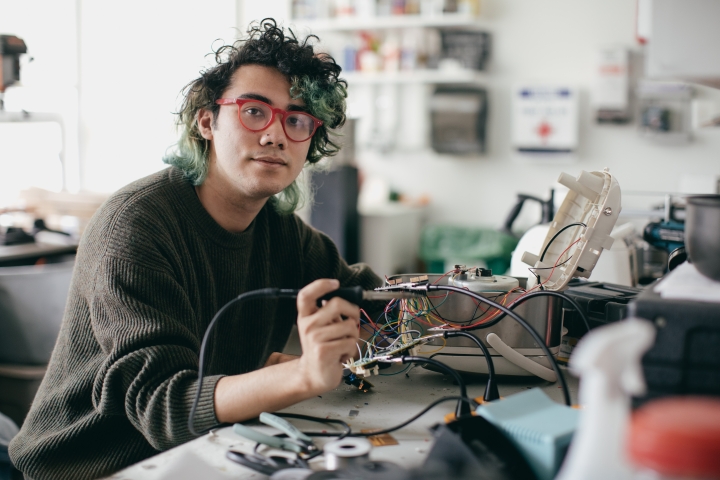At the end of this month, Trevor Van de Velde, Guarini ’22, a graduate student in Digital Musics, will switch on a cluster of rice cookers, not just to serve a meal, but to make music.
“He won a Hopkins Center for the Arts Integration Initiative Grant to develop a brilliant project, called ‘Hacking Grains,’ into his thesis installation this spring,” says Associate Professor of Music Ash Fure. “He’s using Arduino-hacked rice cookers that function as custom instruments.”
Arduino is an electronics platform that receives inputs from sensors and can control activators, including lights and sounds.
Here, in simplified terms, is the recipe for Van de Velde’s multi-media installation.
- Find at least 20 used electric rice cookers.
- Take the appliances apart and convert them into small synthesizers.
- Program the machines to make sounds and emit light while at the same time cooking rice.
- Connect the cookers to each other and to speaker cones placed around the room. Fill the cones with raw rice. (“The low frequencies will vibrate and rattle the grains of rice. The various frequencies and intensities will cause the grains of raw rice to react differently, emphasizing its physicality and texture,” says Van de Velde.)
- Ask the New-York-based piano duo Chromic Duo to perform on these instruments.

The idea for the installation bubbled up in Van de Velde’s family’s kitchen in Fresno, Calif., during a COVID-19 lockdown. Van de Velde, who is Chinese-American, became fascinated by his mother’s rice cooker, “a fancy appliance that, whenever you press ‘start,’ plays music.”
Nothing wrong with hearing a little tune as you wait for rice to cook, he thought. But the repertoire seemed out of sync with his Asian heritage.
“How come it always played Western classical music?” he wondered. “These appliances, they could sound like anything. I wanted to rip out the little speaker and insert my own sounds and expand its capability into a fully working music instrument capable of musical expression.”
Which is exactly what he’s spent the last few months doing, in his studio at the Hop.

With his thesis project, Van de Velde says he wants to pay respect to the cultural significance of rice. “In a lot of East Asian languages, the verb ‘to eat’ contains the word for ‘rice.’ So for us, it’s a grain at the core of humanity” he says.
Before the pandemic hit, Van de Velde loved giving dinner parties. “It was my favorite thing to do, because the power of eating a meal with other people is so beautiful. I wanted to bring that into the classical music scene, using the rice cookers as a cultural technology that brings people together in a form of communion.”
At 8 p.m. on April 30 in Room 58 in the basement of the Hopkins Center for the Arts, he’ll serve up a one-of-a-kind sonic feast. And he’ll also dish out the cooked rice at the end of the performance.
Admission is free, but registration is required.


